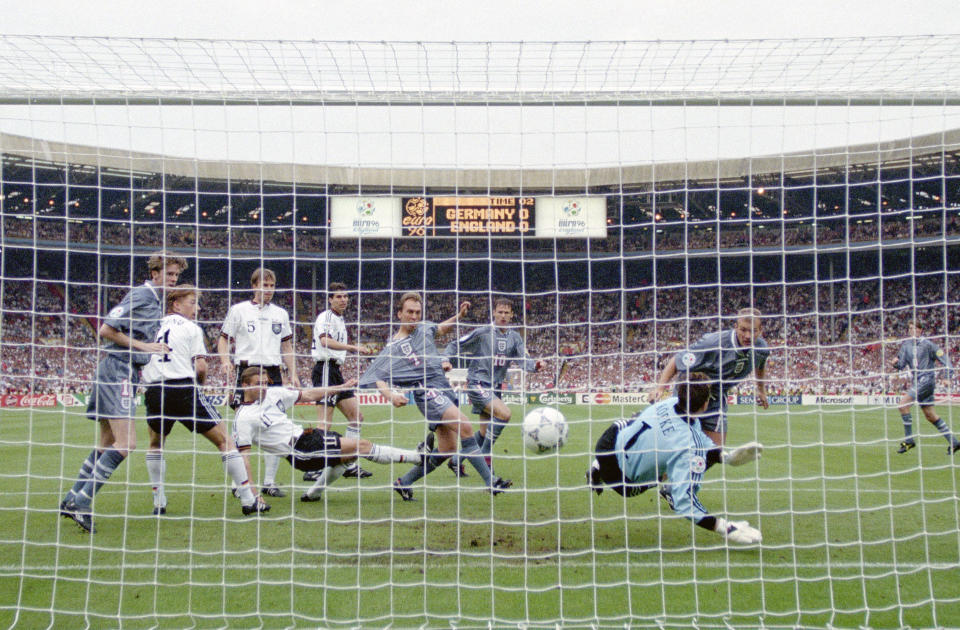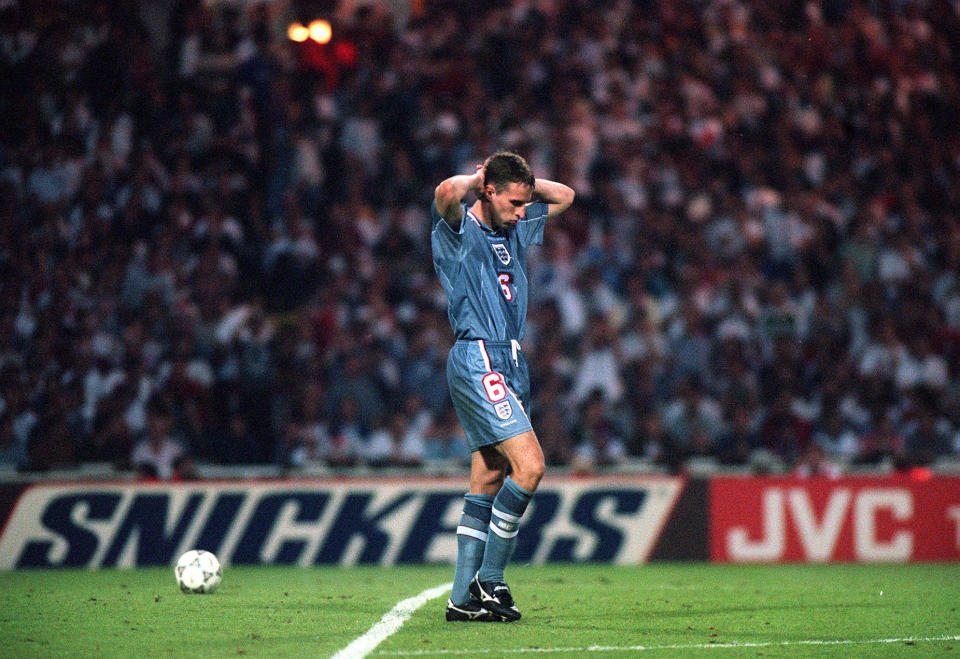Our Favorite Games: Why England's Euro 96 semifinal loss? Because ...

“Hello again, glad you’ve tuned in,” said BBC anchor Des Lynam on the evening of Wednesday June 26th, 1996. “You’ve obviously heard there’s a football match on tonight.”
As an introduction to the most important moment in English history for 30 years, it was something of an understatement.
That summer, the UK was firmly in the grip of soccer fever, as England hosted its first tournament since 1966. On that occasion, the Three Lions beat Germany at Wembley Stadium to lift their only World Cup.
On that balmy mid-90s summer evening, England faced their fabled rivals at their home stadium once again, with a place in the Euro 96 final on the line. This writer was 12 years old at the time, and nothing had ever felt more important.
And to be honest, nothing has felt more important since.

After the profuse embarrassment of failing to qualify for the 1994 World Cup, England had a talented team and home advantage to capitalize on. Following a long period during which the nation’s pastime had been marred by hooliganism, and watched in neglected, crumbling stadiums, soccer had been revitalized.
The launch of the Premier League a few years earlier brought a new level of glamor, accessibility and financial clout to the English game. This coupled perfectly with the cultural phenomenon of “Cool Britannia.” British fashion was on top of the world, with Kate Moss as its bastion, while Oasis ruled the airwaves.
Just like in 1966, it felt like England had the world’s best fashion, music and football. We were on top of the world and destined to put the Germans to the sword at Wembley, once again.
England’s path to the Euro 96 semifinals did nothing to quell the surge of national excitement. Following a nervy opening match draw with Switzerland, Terry Venables’ side triumphantly swept aside neighbors to the north Scotland. The Auld Enemy had been defeated, while star player Paul Gascoigne scored one of the all-time great international goals.
Then followed a truly glorious 4-1 decimation of Holland to reach the last eight in style. Quarterfinal opponents Spain were dismissed in the very rarest of circumstances: a penalty shootout victory. Yes, for England!
Stuart Pearce, who famously missed his penalty in the 1990 World Cup semifinal shootout against Germany, slammed his spot kick into the back of the net. It was his vindication, and his relieved reaction brought tears of joy to the collective eyes of the nation. Pearce was a warrior, who had successfully exorcised the ghost of Italia 90. His bravery would lead England all the way.
As the teams made their way onto the field at Wembley, the crowd erupted into the refrain of a song that summed up the hopes of the country: “It’s coming home, it’s coming home, it’s coming… football’s coming home.”
Even through the speakers of the boxy Sony TV on which this writer watched the game, the chorus of “Three Lions” being sung in unison sent chills down the spine. That’s no easy feat on a hot summer evening in a home with no air conditioning.
Another stroke of good fortune came from the teamsheet: Germany’s star player and captain, Jurgen Klinsmann, was not selected. The only universally recognizable player in the German team (thanks to his spell with Tottenham Hotspur) had picked up an injury in the quarterfinal match against Croatia.
The stage was set for England, who set up in a daring 3-4-3 formation, which was unusual for a soccer culture built firmly upon the meat-and-potatoes 4-4-2.
The levels of intensity and violence are high from the outset. It’s an open game, with plenty of space through the middle, and an abundance of lunging tackles that would draw punishments and pained reactions in modern times.

After just three minutes, England make the breakthrough when Alan Shearer heads home after captain Tony Adams takes a near-post touch on a Gascoigne corner.
It’s a simple training ground routine, where Shearer — who would become the world’s most expensive player a few weeks after the tournament — was suspiciously unmarked. It was a very un-German way to defend, and all signs pointed to a good evening for the hosts.
Shortly after the quarter-hour mark, however, Klinsmann’s replacement Stefan Kuntz beat Pearce for pace in the box and slid in the equalizer from a cross.
Replays would show that Thomas Helmer was actually offside in the buildup, but that was far from the biggest emotional twist the hosts would suffer on the evening.
England dominated the chances as the summer sun went down, and Wembley was bathed in floodlights by the time 90 minutes had expired. Normal time finished honors even.
Not only were England facing extra time against their fiercest enemy, but it was Golden Goal extra time. Next goal wins. The anxiety was unbearable; only the edges of seats in England were being occupied.
After just 80 seconds of extra time, Darren Anderton connected with a Steve McManaman cross and hit the post! England were literal inches away from ending the game and heading to the final.
Five minutes later, the pendulum of excitement swung violently the other way, as Kuntz appeared to have scored his second goal of the evening with a rocket header from a corner.
It was all over.
But wait! Against the odds, the referee whistled for a foul Kuntz had allegedly committed prior. It was a lucky escape and a soft decision, but the match continued.
Two minutes later, another gut punch arrived for the hosts. Teddy Sheringham floated a ball into the box, which Shearer volleyed into the path of an outstretched Gascoigne. The Geordie star had beaten his defender and had an open goal to slide the ball into ... but he was a split-second too late, and slid into the net as the ball continued rolling.
After a few more chances, the inevitable came.
Penalties.
Despite England’s shootout despair against Germany in 1990, there was still hope that this team had the fortitude to pull through. Shearer, David Platt, Pearce, Gascoigne and Sheringham all converted from the spot, but all were matched by their German counterparts.
With the exception of the left-footed Pearce, all England takers had successfully put their penalty to the goalkeeper’s left side.
But then, England’s sixth penalty taker, Gareth Southgate, stepped up. He put his penalty to Köpke’s left. It was saved.
Heartbreak for a nation. Heartbreak for a team who came within a hair’s width of redressing the balance of the previous 30 years. Heartbreak for a devastated 12-year-old watching on a boxy Sony TV in South London.
Germany progressed, and with a Golden Goal in the final against the Czech Republic, they made it 10 wins from their last 13 major tournaments.
“Football is a simple game,” said former England striker Gary Lineker. “Twenty-two men chase a ball for 90 minutes and at the end, the Germans always win.”

Most soccer fans would likely choose a game in which their team won as their favorite. So why would I select a game in which my team lost in devastating fashion?
The semifinal defeat against Germany is the kind of game that shows why soccer has such a profound relationship with the human condition around the world. An entire country ground to a halt as its fortunes unfolded against an opponent it had not only fought on the soccer field. It was unscripted drama that united every person in the land.
Euro 96 was the first major tournament in which this writer watched every game and obsessed over the progress of all teams. It was the formation of a true love of the beautiful game, and it culminated in a rollercoaster ride of emotion that is still etched on the collective consciousness of a nation.
I wish the result had gone differently, but the bittersweet experience of that Wednesday night in June 1996, crowded around the TV with my family, will likely never be matched.
More of Our Favorite Games:

